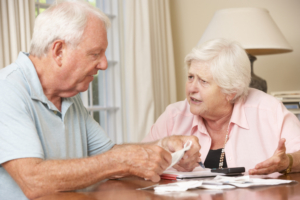There is a long-established principal of law that holds that spouses are jointly and severally liable for debts incurred to third-parties for “necessities” (i.e., common-law doctrine of necessaries). Essentially, under the doctrine of necessities, a spouse is equally responsible for payment of a debt incurred for the provision of life’s essentials. For example, a husband is equally responsible for a debt incurred exclusively by his wife (i.e., husband was not a party to the transaction) for groceries or housing.
The Massachusetts legislature has enacted a law codifying this common-law doctrine, Mass. Gen. Laws. ch 209, § 1 (“G.L. ch. 209”). Under G.L. ch. 209, “spouses shall be liable jointly or severally for debts incurred on account of necessaries furnished to either spouse or to a member of their family.” While the G.L. ch. 209 does not define “necessities”, Massachusetts’ Supreme Judicial Court has stated, when discussing the common-law doctrine, that the term is “not confined to articles of food or clothing required to sustain life, but has a much broader meaning and includes such articles for use by a wife as are suitable to maintain her according to the property and condition in life of her husband.” Jordan Marsh Co. v. Cohen, 242 Mass. 245, 249 (1922).
Consequently, the Courts have found that necessities include nursing home care. See Mediplex of Mass., Inc. v. Donovan, 1994 Mass.App.Div. 123, 1994 WL 361967 (1994) and Emerson Vill., LLC v. Jode, No. MICV201201736F, 2012 WL 6928123 (Mass. Super. Dec. 15, 2012). In Emerson, husband and wife (“Husband” and “Wife”) were a long-married couple. In April 2010, Husband was admitted to skilled nursing facility (“Nursing Home”) for long term care. Husband applied for MassHealth long term care benefits (“Benefits”) to cover his nursing home expenses. Husband’s Benefits application, however, was denied several times for failure to provide the necessary verifications. Husband died in 2012. At the time of his death, Nursing home had provided Husband with room, board and skilled nursing services for approximately twenty-two months without receiving payment. Nursing Home, thereafter, filed an action in Superior Court seeking payment for said services from Wife under G.L. ch. 209. In granting Nursing Home’s Motion for Summary Judgment (i.e., Nursing home is entitled to judgment as a matter of law), the Court found that, pursuant to G.L. ch. 209 necessities include nursing home services and that Wife was equally responsible for providing payment.
In short, G.L. ch. 209 can be extremely effective tool for recovering payment from spouses of residents who have otherwise refused to provide payment.
Please contact Cohen Cleary, P.C. for information regarding your Massachusetts nursing home law firm needs.
Authored by Peter Thomas, Esq.

